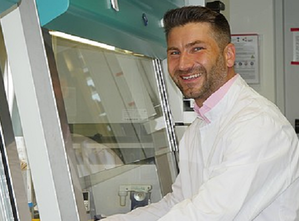Diätetische Modulation von Bakteriophagen als bislang unterschätzte Akteure bei Entzündungen und Krebs [01.05.21]
Die Rolle und Funktion von Bakteriophagen (Phagen) im Darm mit Bezug zu Gesundheit und mikrobieller Homöostase wurde bisher unterschätzt. Ein interdisziplinäres Team aus Baden-Württemberg (u.a. Prof. Dr. Sascha Venturelli von der Universität Hohenheim) analysiert in einem aktuellen Übersichtsartikel die Effekte von Nahrungskomponenten auf Phagen und erweitert diese Perspektive auf eine mögliche Rolle von Phagen bei Magen-Darm-Erkrankungen, insbesondere Entzündungen, Infektionen und Krebs. Im Artikel werden neben diesen Zusammenhängen auch damit verbundene Interventionsoptionen diskutiert. Dazu gehören Überlegungen, wie die Aktivität bestimmter Phagen durch Nährstoffkomponenten moduliert werden könnte, um eine Reorganisation des Mikrobioms anzuregen und so Entzündungen oder gar Krebs im Darm zu bekämpfen bzw. zu verhindern (Marongiu et al, 2021).
Original Article
Luigi Marongiu 1 , Markus Burkard 2 , Sascha Venturelli 2 3 , Heike Allgayer 1 (2021) Dietary Modulation of Bacteriophages as an Additional Player in Inflammation and Cancer. Cancers (Basel). 2021 Apr 23;13(9):2036. doi: 10.3390/cancers13092036.
Affiliations
- Department of Experimental Surgery-Cancer Metastasis, Medical Faculty Mannheim, Ruprecht-Karls University of Heidelberg, Ludolf-Krehl-Str. 13-17, 68167 Mannheim, Germany.
- Department of Biochemistry of Nutrition, University of Hohenheim, Garbenstr. 30, 70599 Stuttgart, Germany.
- Department of Vegetative and Clinical Physiology, University Hospital of Tuebingen, Otfried-Müllerstr. 27, 72076 Tuebingen, Germany.
PMID: 33922485 | DOI: 10.3390/cancers13092036
Abstract
Natural compounds such as essential oils and tea have been used successfully in naturopathy and folk medicine for hundreds of years. Current research is unveiling the molecular role of their antibacterial, anti-inflammatory, and anticancer properties. Nevertheless, the effect of these compounds on bacteriophages is still poorly understood. The application of bacteriophages against bacteria has gained a particular interest in recent years due to, e.g., the constant rise of antimicrobial resistance to antibiotics, or an increasing awareness of different types of microbiota and their potential contribution to gastrointestinal diseases, including inflammatory and malignant conditions. Thus, a better knowledge of how dietary products can affect bacteriophages and, in turn, the whole gut microbiome can help maintain healthy homeostasis, reducing the risk of developing diseases such as diverse types of gastroenteritis, inflammatory bowel disease, or even cancer. The present review summarizes the effect of dietary compounds on the physiology of bacteriophages. In a majority of works, the substance class of polyphenols showed a particular activity against bacteriophages, and the primary mechanism of action involved structural damage of the capsid, inhibiting bacteriophage activity and infectivity. Some further dietary compounds such as caffeine, salt or oregano have been shown to induce or suppress prophages, whereas others, such as the natural sweeter stevia, promoted species-specific phage responses. A better understanding of how dietary compounds could selectively, and specifically, modulate the activity of individual phages opens the possibility to reorganize the microbial network as an additional strategy to support in the combat, or in prevention, of gastrointestinal diseases, including inflammation and cancer.
 | Mehr Info zu Prof. Dr. Sascha Venturelli seiner Forschung |


